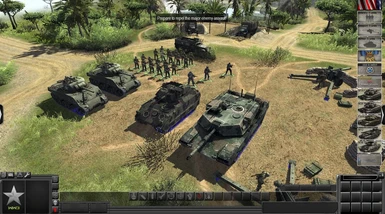

What’s more, we don’t even know the impetus for why the cold war has suddenly heated up, invoking the response of a wave of troops. There’s some tangential resources allotment to signal progression but there’s no sense of anything like momentum, morale. Instead, it offers a dynamic campaign spread across a sequence of days. Largely, Assault Squad 2 – Cold War doesn’t offer any kind of narrative support for its events. Those hoping for a campaign that images a ‘what-if’ take on say, the failed Bay of Pigs offensive, will be disappointed. Miserably, it disappoints in almost every possible way, providing little insight into the complexities of a rivalry that that pushed the planet toward nuclear catastrophe. Released thirty-five years after Chris Crawford’s title, Men of War: Assault Squad 2 – Cold War seems poised to explore a similarly thorny context, albeit with three-dimensional visuals replacing the text-based delivery of Balance of Power. It might not have been much to look at, but it certainly stimulated contemplation. While Balance of Power didn’t flaunt fancy visuals or even attempt to depict proxy wars, it did reveal the futility of trying to simultaneously outshine your rival while maintaining prestige.

Once your allegiance was confirmed, you’d face a succession of incidents, with decisions habitually ratcheting up the level of disagreement with your rival. The title tasked players with assuming the role of leader for either faction. 1985’s Balance of Power, released when the Western Bloc and the Soviet Union were on the brink of nuclear destruction, is one of earliest examples.

Undoubtedly, games that depict the escalating geopolitical tensions of the Cold War have the potential for distinction.


 0 kommentar(er)
0 kommentar(er)
